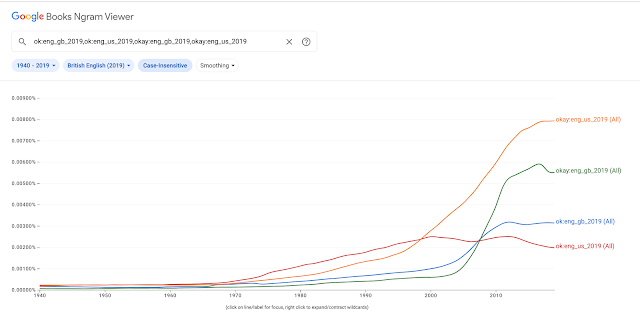I may have promised another topic for this month's blog...but another request has (orig. AmE) come over the transom, and I'm easily distractable, so...
Mike C from Shropshire asks:
Even most BBC news reporters seem to be using “pled” as the past tense / past participle. … Any thoughts?
Pleading and plea-ing
Let's start with a basic observation of pled versus pleaded: the use of pled is fairly particular to much more common in legal pleas. One can have pled guilty, innocent, (AmE) no contest, or (AmE) the fifth, though many sources would tell you to use pleaded instead. So we get:
- He pled guilty = real but prescriptively frowned-upon
- She pleaded guilty = real & prescriptively cherished
- He pleaded for their forgiveness = real & common
- ?? She pled for their forgiveness. =
unnatural-soundingmuch less common overall (except maybe for Scottish English speakers? See below and comments) and prescriptively frowned-upon
As you can see in the Corpus of Historical American English, it's rare to have pled for anything, but things can be pleaded for:
Because of this, I'm going to focus my corpus searches on use of pleaded/pled guilty.
The British history of pled
Since this is Separated by a Common Language, we have to ask: is this an Americanism coming into British English? And the answer is: Wait a minute!
The Oxford English Dictionary labels pled "(chiefly Scottish and U.S.)." There's lots of evidence of pled in BrE before it could reasonably be thought of as an imported Americanism—it goes back to the 1600s. In Hansard, the parliamentary record, it's found here and there since the late 19th century:
 |
| pled guilty in Hansard |
I haven't checked every example, but in the 1890s and 1990s all of the pled guilty examples are from Scottish Members of Parliament:
So, pled is a form with a long history in one part of the UK, at least. With the BBC diversifying its on-screen workforce in recent decades, there may be a rise in south-of-the-border exposure to that particular form of the verb. (I've talked about Scottish bureaucratese moving south in at least one other post.)
The American history of pled
So pled might come to the US with Scottish immigrants. But.
In AmE pled really gets going in the late 20th century. The biggest waves of Scottish migration to the US had happened (as far as I can find out) in the late colonial period (when they would have accounted for a much larger proportion of the English-speakers in the US, and therefore might have had a greater effect on American English, than later immigrants would). It's possible that it was very common in speech in earlier times and had to become "respectable" before making it into writing much (as is thought to have happened for gotten).
On the other hand, it's very possible that pled was re-invented in the US, on analogy with lead-led and read-read [rɛd]. Certainly, the similarity between pled and these "legit" past forms paves the way for implicit acceptance of pled.
At any rate, the number of pled guilty remains a smaller number than pleaded guilty in the Corpus of Historical American English. But this corpus is mostly written English, much of it edited. I'd expect that there's more pled in speech. That's harder to get one's hands on.
Pled guilty in speech
I had a look at the Open American Corpus (Spoken) from the early 2000s and there was just one example of pleaded and pled each. Spoken corpora just tend to be so much smaller, and so they're not great for tracking vocabulary. And, of course, there are no audio recordings of way-back-when. (Note that the Hansard Corpus above is of transcribed speech—we have to assume it's a pretty good fascimile of the speech.)
The Open Subtitles 2018 (English) corpus (which I've accessed via Sketch Engine) contains scripted (film/movie) speech. That's not the same as natural speech, but the people writing the speech have every motivation to make it sound natural. What's interesting there is the turnaround of pled's fortunes:
- pled guilty: 356
- pleaded guilty: 295
| UK | USA | |
| pleaded guilty | .02 | .02 |
| pled guilty | — | .07 |
Is pled in UK English a case of "Americani{s/z}ation"?
It's hard to say if BBC use of pled is Scottish voices, Scottish usage spreading or American usage borrowed. I'm going to vote for "probably all of the above". The prevalence of US courtrooms in media has led to The Law Society pointing out American things that show up in UK legal dramas: No gavels please, we're British.- 53 were from Scotland
- 30 were from either English local news or UK national news
- 10 were clearly North American stories in national news—so probably from wire services
- 1 Northern Irish
- 1 Wales
- 5 ?
 |
| pled guilty in NOW-GB |



















